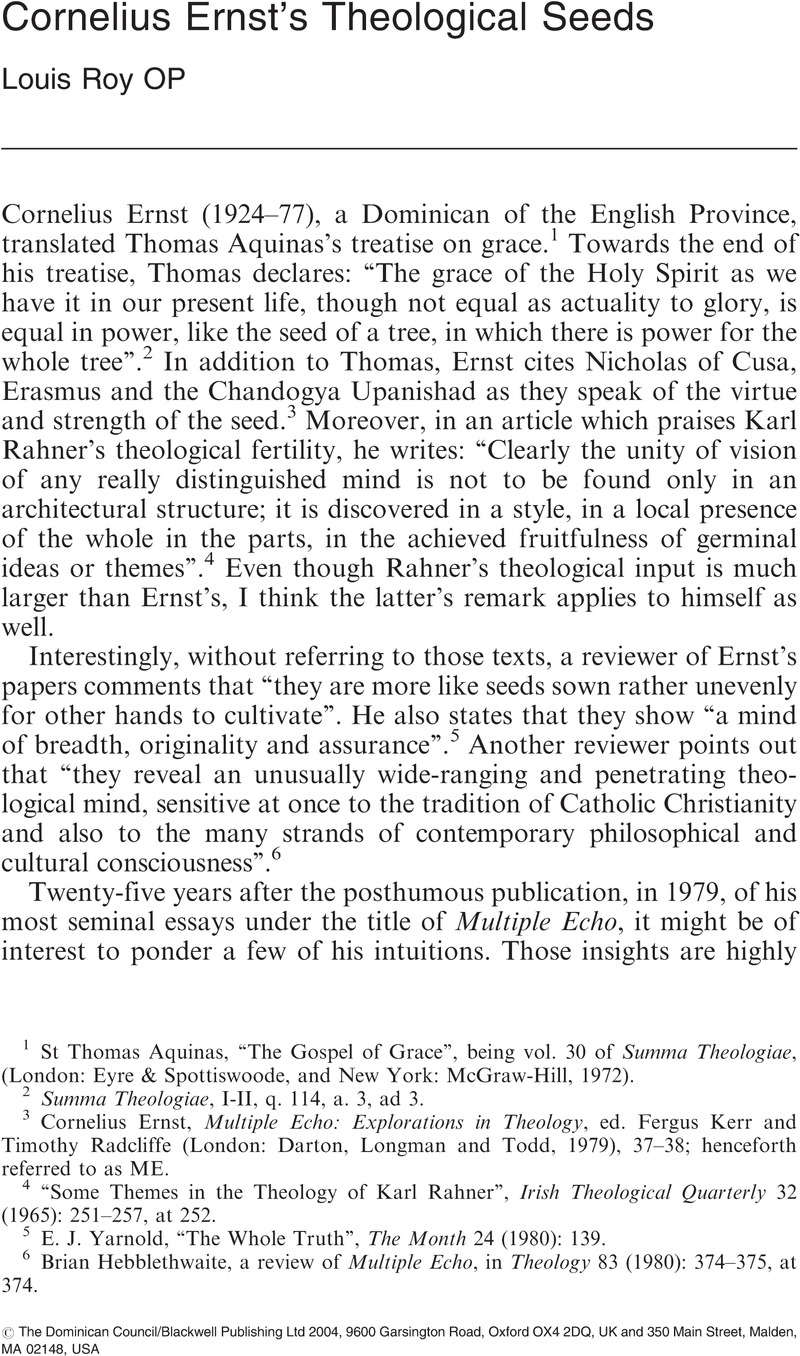Article contents
Cornelius Ernst's Theological Seeds
Published online by Cambridge University Press: 01 January 2024
Abstract

- Type
- Original Articles
- Information
- Copyright
- Copyright © The Dominican Council/Blackwell Publishing Ltd 2004
References
1 StAquinas, Thomas, “The Gospel of Grace”, being vol. 30 of Summa Theologiae, (London: Eyre & Spottiswoode, and New York: McGraw-Hill, 1972)Google Scholar.
2 Summa Theologiae, I-II, q. 114, a. 3, ad 3.
3 Ernst, Cornelius, Multiple Echo: Explorations in Theology, ed. Kerr, Fergus and Radcliffe, Timothy (London: Darton, Longman and Todd, 1979), 37–38Google Scholar; henceforth referred to as ME.
4 “Some Themes in the Theology of Karl Rahner”, Irish Theological Quarterly 32 (1965): 251–257, at 252CrossRefGoogle Scholar.
5 Yarnold, E. J., “The Whole Truth”, The Month 24 (1980): 139Google Scholar.
6 Brian Hebblethwaite, a review of Multiple Echo, in Theology 83 (1980): 374–375, at 374.
7 See Ombres, Robert and Edney, Mark, “Consideration”, New Blackfriars 82 (2001): 482–485CrossRefGoogle Scholar, esp. 482.
8 “Meaning and Metaphor in Theology”, New Blackfriars 61 (1980): 100–112CrossRefGoogle Scholar, at 105; henceforth referred to as MMT. This all-important point is highlighted in Nicholas Lash's review of Multiple Echo in New Blackfriars 61 (1980): 89–93, at 91–93.
9 The Theology of Grace(Cork: Mercier Press, and Notre Dame, IN: University of Notre Dame Press, 1974), 66–69; henceforth referred to as TG.
10 Cornelius Ernst's obituary, in Acts of the Provincial Chapter of the English Province, 1978, 40–42, at 41.
11 See also “Faith and Reality: Two Major Works of Biblical Theology”, The Life of the Spirit 16 (1961): 3–10, at 6Google Scholar.
12 In the latter part of his career, Thomas Aquinas ceased using proportionality and instead kept only the analogy of attribution (a simple proportio) in his approach to God; see Patfoort, Albert, “La place de l’analogie dans la pensée de S. Thomas d’Aquin’, Revue des Sciences Philosophiques et Théologiques 76 (1992): 235–254Google Scholar. Older studies by George P. Klubertanz, Ralph McInerny, David Burrell and Bernard Montagnes support Patfoort's thesis.
13 See Heidegger, Martin, “… Poetically Man Dwells …”, in Poetry, Language, Thought, trans. Hofstadter, Albert (New York: Harper & Row, 1971), 211–229Google Scholar; also “Hölderlin and the Essence of Poetry”, in Elucidations of Hölderlin's Poetry, trans. Keith Hoeller (New York: Humanity Books, 2000), 51–65.
14 Introduction to Rahner, Karl, Theological Investigations(London: cDarton, Longman and Todd, 1961Google Scholar, and New York: Crossroad, 1982), vol. 1:xvii, note 1. In this introduction readers can find what Ernst thinks is significant in Heidegger's philosophy. At the end (xix) he also acknowledges his indebtedness to Rahner.
15 Ibid., xvi-xvii.
16 “The Ontology of the Gospel”, The Thomist 27 (1963): 170–181, at 171CrossRefGoogle Scholar.
17 Quaestiones disputatae de veritate, q. 24, a. 14; see The Disputed Questions on Truth, vol. 3, trans. Schmidt, Robert W. (Chicago: Regnery, 1953), 205–206Google Scholar.
18 In “A Preface to Theology”, Journal of the Anthropological Society of Oxford 2 (1971): 1–8Google Scholar, at 4, Ernst praises Wittgenstein's later philosophy as “a disclosure of mind in action, of “mind” as an indefinitely fluid activity of meaning”.
19 Introduction to Rahner, Theological Investigations, vol. 1:xiii-xiv.
20 “A Preface to Theology”, 6.
21 Summa Theologiae, I, q. 2, a. 3. As a matter of fact, Ernst cites this refrain in MMT, 101.
22 “Thinking about Jesus”, New Blackfriars 61 (1980): 208–215, at 215CrossRefGoogle Scholar.
23 On the connection between the death and resurrection of Jesus and the meaning of human destiny, see Ernst, , “A Theological Chronicle”, Blackfriars 41 (1960): 220–227, at 222CrossRefGoogle Scholar.
24 B. R. Brinkman, a review of Multiple Echo, in The Heythrop Journal 22 (1981): 346–348, at 348.
25 “Truth and Verification in Theology”, Blackfriars 40 (1959): 100–111, at 107 and 111CrossRefGoogle Scholar.
26 “Some Themes in the Theology of Karl Rahner”, 252.
27 See Collected Works of Bernard Lonergan, vol. 3: Insight: A Study of Human Understanding, ed. Crowe, Frederick E. and Doran, Robert M. (Toronto: University of Toronto Press, 1992)Google Scholar.
28 Lonergan, Bernard J. F., Method in Theology(London: Longman, Darton & Todd, 1972Google Scholar; reprint by University of Toronto Press, 1992), 347; see 345–347.
29 See Summa Theologiae, I, q. 3, a. 5.
30 Introduction to “The Gospel of Grace”, xx.
31 Ibid., xx-xxi.
32 See Lonergan, Method in Theology, 82–83 and 304–305 on the systematic exigence, to be recast in light of the critical exigence. For more on this issue, see Roy, Louis, “Can We Thematize Mysticism?”Method: Journal of Lonergan Studies 21 (2003): 47–66, esp. 48–49 and 61–66Google Scholar.
33 “Foreword” to E. Schillebeeckx, Christ the Sacrament of the Encounter with God, (New York: Sheed and Ward, 1963), xvGoogle Scholar.
34 See Roy, Louis, “Medieval Latin Scholasticism: Some Comparative Features”, in Scholasticism: Cross-Cultural and Comparative Perspectives, ed. Cabezón, José Ignacio (Albany, NY: SUNY Press, 1998), 19–34Google Scholar; and “Scholasticism” in Christianity: A Complete Guide, ed. Bowden, John (London and New York: Continuum), forthcomingGoogle Scholar.
35 See Lubac, Henri de, Medieval Exegesis(Edinburgh: T&T Clark, and Grand Rapids, MI: Eerdmans, 1998)Google Scholar.
36 Lubor Velecky, a review of Multiple Echo, in Journal of Theological Studies, N. S., 32 (1981): 310–313, at 312.
37 “Cornelius Ernst: Sermon Preached by Fergus Kerr O.P. at the Requiem Mass at Blackfriars, Oxford, on 26th January 1978”, New Blackfriars 59 (1978): 549–554, at 549Google Scholar.
38 “Tension” is a word that recurs in the sermon just quoted as well as in the brief memoir by Tugwell, Simon, entitled “Cornelius Ernst”, New Blackfriars 59 (1978): 2–4CrossRefGoogle Scholar.
- 3
- Cited by




